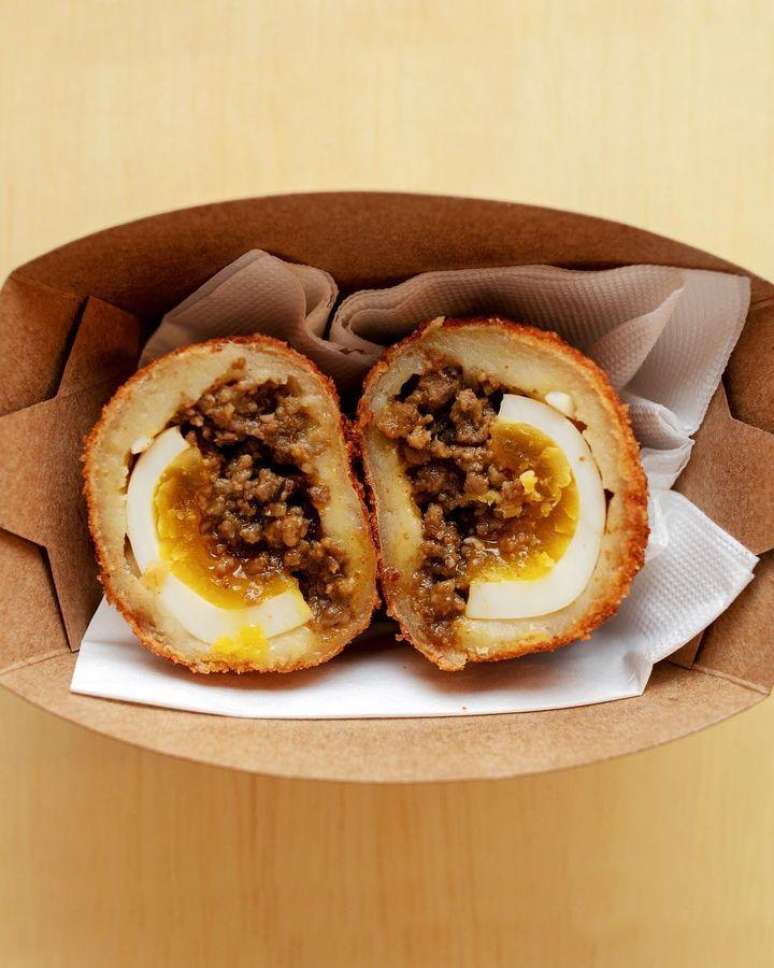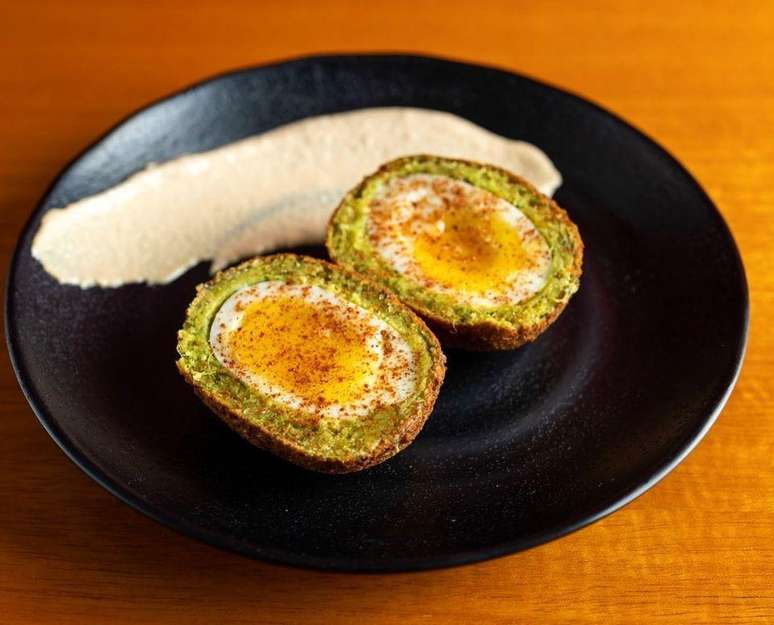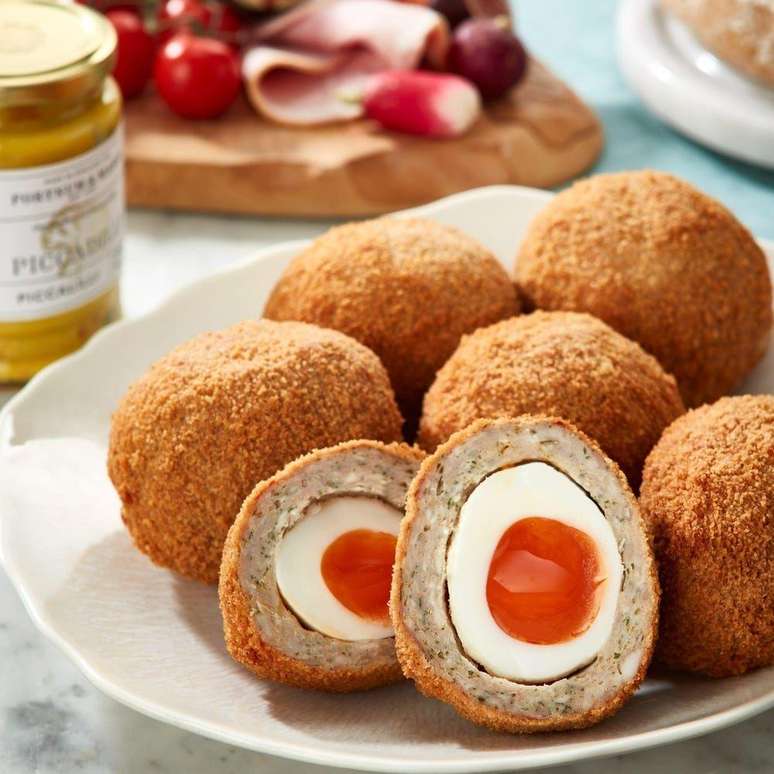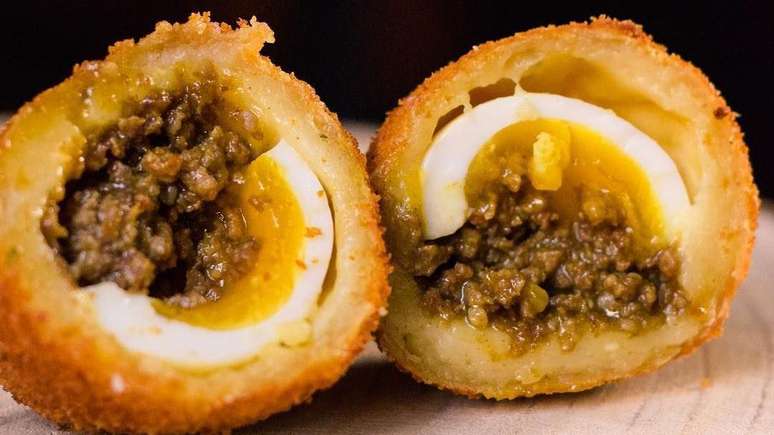A popular food in many Brazilian bars, the savory snack has several versions around the world.
“Bolovo, the urban threat”: this is how an episode of the group’s Christmas special presents itself Hermes and Renato recorded in 2004, for MTV Brasil.
In it, a peaceful citizen defies death (and loses) by eating exclusively bolovo for days on end. Bolovo meant a savory dish found in the greenhouses of the most pedestrian taverns.
A hard-boiled egg, wrapped with minced meat in coxinha dough, forming a dumpling which was then breaded and fried.
Few people at that time called bolovo salty. Or perhaps the name was popular in Petrópolis, where the comedians lived before moving to São Paulo.
“They were meat gnocchi with eggs, egg gnocchi,” says Adriano Silva, best known for playing the character of Joselito, the naive one. “The crowd slowed down towards Bolovo.”
After the special, the name remained in São Paulo. Bolovo won at remake. He resurfaced almost unrecognizably in the bars of Pinheiros and Santa Cecília.
English journalist Catherine Balston had recently been living in the city when she came across this, the gourmet bolovo. The encounter triggered a short circuit in her head: that was a Scotch egg.
The Brazilian Bolovo and the British Scotch Egg started out similar and have become almost identical. Both have their humble past as a conceptual reference.
Both have become vehicles for chefs’ creativity: Almost any food, from sausage to smoked haddock, can involve a bolovo or a scotch egg.
Catherine became obsessed with the similarity between the two delicacies. She researched for weeks and concluded that bolovo and scotch egg are just two of many expressions of a hard-boiled egg wrapped in meat. Similar recipes exist in the Netherlands, Belgium, India, Indonesia and Poland.

Controversial origin
As for the Scotch Egg, the fine food shop Fortnum and Mason, in London, claims paternity.
“The first and best: we created the Scotch Egg in 1738, as a meal for travelers departing from Piccadilly [região central de Londres, onde se encontra a F&M] to the west,” the store’s website boasts.
According to the aristocrat cafeteriathe original recipe was made with eggs from young, small hens.
After cooking, they were covered with a mixture of meats, spices and anchovies, breaded with breadcrumbs seasoned with mace (the outer membrane of nutmeg) and fried.
The evidence points to a less authorial genesis. The Oxford Companion to Food, the definitive reference work on British gastronomy, states that “its origin is uncertain, although it may descend from an Indian form of kafta”.
The dish in question is nargisi koftaeggs wrapped in spiced mutton and served in hearty curry sauce.
The Scotch Egg has evolved into a snack that is neither sophisticated nor exotic. Typically, it is cooked until the yolk is hard and wrapped in sausage meat – in England, pork seasoned with white pepper, thyme and sage.
“Pubs have started making scotch eggs to avoid ruining leftover sausage,” says Greigor Caisley, an Australian chef living in Sao Paulo.

“It’s something we used to buy at the supermarket or convenience store,” Catherine says.
In England, markets have specific aisles of sandwiches, snacks and ready meals that people eat on the street or in parks, replacing lunch with a table, chair, plate and cutlery.
The scotch egg appears in this section and is eaten cold, as a quick stop during the race. Or rather, it once was like this.
‘gourmetized’ cake
In the 21st century, British cuisine has progressed far beyond its proverbial fame.
“Pubs have changed, and so has the Scotch Egg,” says Catherine. Many traditional bars have given way to gastropubs, with table service and elaborate dishes.
The Scotch egg needed a redesign. In the egg – the yolk was starting to become creamy, less cooked – and in the meat.
The Lamb pub in London’s Bloomsbury region lives up to its name with a lamb’s egg and apricot scotch, beer mustard on the side.
Nearby, The Lady Ottoline’s scotch egg is made with smoked salmon and served with fennel mayonnaise and curry and costs a whopping £12, about R$75 (the one at Fortnum & Mason costs £4.50, or R$ 28).

In London you can buy scotch eggs in various flavors on The Gourmet Scotch Egg Co website.
Catering service Finest Fayre serves street markets across the city, with versions of Spanish chorizo, black pudding and smoked haddock, among many others.
At Fortnum and Mason, the supposed inventor of English Bolovo, the options available on Sunday afternoon (24/9) were: chickpea, feta and pepper; wild mushrooms and truffles and; coronation Chicken (chicken with mayonnaise and curry, recipe created for the coronation of Elizabeth II). Nothing to do with the classic scotch egg.
The Brazilian Bolovo, whose birthplace has never been seriously studied, followed the same path. Greigor, chef at the Guarita bar, in Pinheiros, participated in this story.
He began making scotch eggs at Drake’s, a pub that operated in the Centro Britânico Brasileiro building, in São Paulo.
Customers began to call the delicacy Bolovo. Greg then decided to also play with the Brazilian Bolovo, which is needed by Guarita.
Of the new generation of bolovos, Guarita is one of the few that follows the traditional formula, with a mixture of thighs and minced meat. In most bars in São Paulo, pasta was abolished: the bolovo technically became a scotch egg.
The Bagaceira bar, in Santa Cecília, offers bolovo de morcilla – Spanish-American black pudding. At Bar do Momo, in Rio, they use cod fritter dough.
At Pinati, an Israeli restaurant in Higienópolis, what surrounds the egg are falafel. The creature’s name: falevo.
Brazilians and English compete to see who is most creative in frying a hard-boiled egg.
British bakeries invented the “Scotch Easter egg”: at Fortnum and Mason, it is made with milk chocolate filled with orange ganache (egg yolk) and “breaded” with almond praline.
Condiment maker Colman’s, in 2022, launched a nearly standard, flavorful Easter Scotch egg made with lamb (symbolic of Jesus’ sacrifice) and accompanied by mint jelly.
Here’s a tip for 2024 in Brazil: Easter cake. And may the Universe forgive me for this.
Source: Terra
Rose James is a Gossipify movie and series reviewer known for her in-depth analysis and unique perspective on the latest releases. With a background in film studies, she provides engaging and informative reviews, and keeps readers up to date with industry trends and emerging talents.






